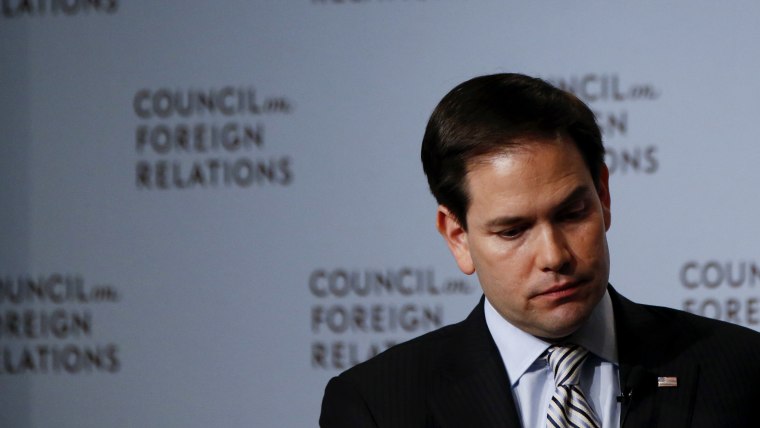Marco Rubio used to consider immigration his signature issue. When that didn't turn out well, the Florida senator decided national security would be his new area of expertise.
Maybe he should keep looking. Consider
this line from last night's debate.
"Today, we are on pace to have the smallest Army since the end of World War II, the smallest Navy in 100 years, the smallest Air Force in our history. You cannot destroy ISIS with a military that's being diminished."
It's amazing to me that Rubio, for all of his purported interest in the subject, still doesn't understand the basics.
Former Defense Secretary Robert Gates recently
said his party's national candidates "don't know what they're talking about" and maintain a "level of dialogue on national security issues that would embarrass a middle schooler." Why Rubio is so eager to prove Gates right is a mystery.
As we
discussed over the summer, when the senator first started pushing this line, this was actually one of Mitt Romney's more embarrassing talking points.
Indeed, this was the basis for arguably the biggest takedown of the 2012 presidential campaign. In the third debate between President Obama and Romney, the Republican complained, "Our Navy is smaller now than at any time since 1917.... Our Air Force is older and smaller than at any time since it was founded in 1947."
Romney had used the same argument many times on the stump, and the prepared president pounced. "Well, governor, we also have fewer horses and bayonets, because the nature of our military's changed," Obama
explained. "We have these things called aircraft carriers, where planes land on them. We have these ships that go underwater, nuclear submarines. And so the question is not a game of Battleship, where we're counting ships. It's what are our capabilities?"
It was a rough moment for the Republican, whose canned talking points were made to look ridiculous. And yet, Rubio insists on repeating them.
Bloomberg Politics had a
good piece on this a while back, noting that the GOP senator's arguments "don't add up."
[T]he numbers of ships and planes don't define U.S. military capabilities. Modern warships, notably aircraft carriers and submarines, are far more effective and lethal than their World War II predecessors. The Air Force is preparing to field the costliest jet fighter ever built, Lockheed Martin's F-35, and already has the second generation F-22 with stealth characteristics. Advances in precision guidance and intelligence collection make even older aircraft such as the F-15 and F-16 far more capable than the jets that preceded them.
Romney at least had a decent excuse -- he had no foreign policy experience, no national security experience, no working understanding of how the military operates, and he hadn't even held public office for the six years leading up to the 2012 campaign.
But Rubio claims to be his party's most impressive expert on matters of national security -- the Republican authority on keeping Americans safe. So why is he relying on discredited talking points from a candidate who failed four years ago?
Of course, this was just one example from last night's debate.
Slate's Fred Kaplan
described the entire Republican field as "clueless" and "shockingly uninformed" about international affairs and security issues.
